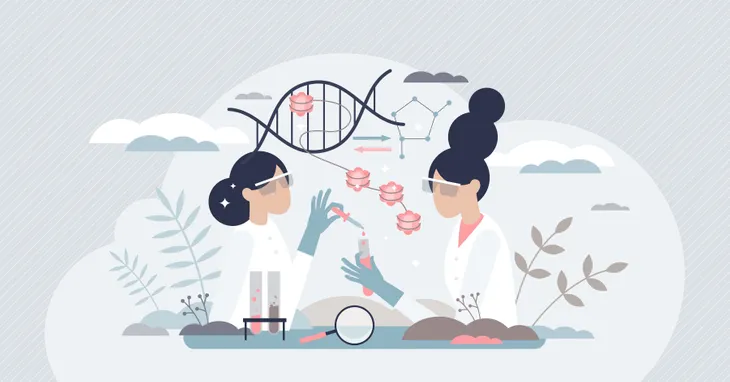- Genetic testing can examine your DNA and find out if you have any mutations in your genes that may cause illness or disease.
- It can be beneficial in confirming or ruling out a suspected genetic condition but it does have its limitations.
- Working with a genetic counselor is important to determine if genetic testing is right for you, what type of tests you’ll need, and to help you understand your results.
Medical testing has come a long way, including genetic testing. These amazing medical tests can examine your DNA and find out if you have any mutations in your genes that may cause illness or disease.
While genetic testing can be an amazing tool in preventing, diagnosing, and even treating some diseases, it does have limitations. To help you get informed, let’s take a look at everything there is to know about genetic testing including its purpose and benefits as well as the possible risks and limitations. We’ll also walk you through how to prepare for an upcoming genetic test and what you can expect during the process. Let’s dive in!
What Is Genetic Testing?
In short, genetic testing is a type of medical test that looks for changes (also known as mutations or variants) in your DNA. The results of a test can help “confirm or rule out a suspected genetic condition or help determine a person’s chance of developing or passing on a genetic disorder,” explains MedlinePlus.
It’s important to note that genetic testing is voluntary and the decision to do it can be complex and personal, says the source. Especially because there are benefits as well as some limitations and risks to the testing.
For example, finding out you have a genetic mutation for a particular disease can be helpful in taking steps to prevent that disease, but it can also affect you mentally knowing you have an increased risk. This is why genetic counseling is recommended. So that you can weigh the pros and cons, find out if genetic testing is right for you, and help you understand your results.
What Is the Purpose of Genetic Testing?
The purpose of genetic testing is to examine your DNA to find out if you have any mutations in your genes that may cause illness or disease. There are different types of genetic testing and they’re all done for different reasons.
The Centers for Disease Control and Prevention (CDC) also explains the purpose of genetic testing may be to:
- Find out if you have a genetic condition that runs in your family before symptoms arise.
- Find out the chance a current or future pregnancy will have a genetic condition.
- Understand and lead your cancer prevention or treatment plan.
- Diagnose a genetic condition if you have symptoms.
Types of Genetic Tests
Unfortunately, there isn’t one genetic test that can detect all genetic conditions, notes the CDC. As mentioned earlier, there are many different types of genetic testing, and they each have their own goal for finding out information.
The type of genetic test you receive will be unique to your medical and family history, as well as the condition you’re being tested for. Let’s take a look at some of the common types of genetic testing next.
Targeted Single Variant Testing
Targeted single variant testing is meant to look for a specific variant in one gene. The chosen variant that is being tested is known to cause a disorder, “for example, the specific variant in the HBB gene that causes sickle cell disease,” explains MedlinePlus.
This type of genetic testing is typically used when an individual wants to find out if they have a condition that runs in the family — meaning, if your grandmother or mother had a particular illness, you may want to be tested to find out if you have that specific variant in your gene too.
Single Gene vs. Gene Panel Testing
Single gene tests are used to search for any genetic changes in one gene. This test is also used to confirm or deny a specific diagnosis, especially when there are many variants in the gene that may cause the suspected condition.
In contrast, a gene panel test will look for variants in more than one gene. This is typically used to identify a diagnosis when an individual has symptoms of a variety of conditions. It’s also used when “the suspected condition can be caused by variants in many genes,” explains MedlinePlus. The source uses epilepsy as an example as it has hundreds of genetic causes.
Large Scale Genetic or Genomic Testing
Large-scale genetic tests are also available. They include:
- Exome sequencing external icon tests observe all the genes in your DNA (known as whole exome), or only the genes that are related to medical conditions (known as clinical exome).
- Genome sequencing external icon tests are the biggest genetic tests and they observe all your DNA, not just the genes.
The CDC explains both of these tests are ordered by doctors for individuals with complex medical histories. They’re also used when a single gene or panel testing can’t provide a diagnosis or when the suspected condition or genetic cause is unclear, says MedlinePlus. This type of testing can also be more cost-effective and less time-consuming compared to multiple single gene or panel tests.
Other Types of Testing
There are other types of tests available too. For example, chromosomal tests look for changes in whole chromosomes or long lengths of DNA, says MedlinePlus. Some possible changes may be an extra (or missing) copy of a chromosome or a large piece of a chromosome that is duplicated or missing.
Gene expression is another type of testing that looks at which genes are turned on or off in different types of cells. This information is important because too much “activity (overexpression) or too little activity (underexpression) of certain genes can be suggestive of particular genetic disorders, such as many types of cancer,” explains the source.
Are There Any Risks With Genetic Testing?
The physical risks associated with genetic testing are very small, especially for tests that simply require a blood sample or buccal swab. Prenatal diagnosis testing also has a small but real risk of losing the pregnancy because it requires a sample of tissue or amniotic fluid from around the fetus.
MedlinePlus points out that many of the risks associated with genetic testing are emotional, social, or financial. For example, waiting for your results can cause anxiety and if the results don’t turn out how you hope, it may cause anger, depression, or even guilt. The source also points out the results may cause tension within the family as it reveals information about other family members. Finally, genetic testing can be expensive, ranging from under $100 to over $2000 which can cause its own host of complications, especially if you can’t get insurance coverage.
What Are the Limitations?
Even though genetic testing can be a helpful tool, it does have its limitations. Genetic testing can only provide limited information as it can’t determine if you’ll develop symptoms of a particular disorder, how severe the symptoms will be or if it will progress over time, explains MedlinePlus. The source also notes another crucial limitation is “the lack of treatment strategies for many genetic disorders once they are diagnosed.”
Furthermore, if a particular gene or a disease or disorder has been detected it doesn’t necessarily mean you’re doomed to develop it. The same goes for if the gene isn’t detected. It doesn’t mean you won’t ever develop that particular disease. The source uses breast cancer as an example and explains many individuals who develop it don’t have the breast cancer gene (BRCA1 or BRCA2).
Benefits of Genetic Testing
While there are a few risks and limitations of genetic testing, it also has many benefits. For starters, MedlinePlus explains the test results may provide a sense of relief, especially if you’re feeling uneasy and uncertain about a prognosis.
Receiving a positive result can be beneficial in helping you learn about prevention and monitoring steps. It can also be helpful in discovering treatment options. Another benefit is it can be a helpful tool in newborn screening which can help identify genetic disorders early so that treatment can be started early too. In some cases, genetic testing can help individuals make decisions about having children, explains the source.
The Importance of Working With a Genetic Professional
As mentioned earlier, genetic testing is voluntary and it’s not always easy to decide if it’s right for you. This is why it’s important to work with a genetic professional. It’s vital that you weigh the pros and cons to make an informed decision.
The CDC says genetic counseling before testing can help ensure you’re the right individual in your family to receive the genetic test. They can also help ensure you get the right type of genetic test. Finally, if you decide to go through with testing, a genetic counselor can help you understand your results.
How to Prepare for Genetic Testing
To prepare for genetic testing it’s important to gather as much information about your family’s medical history, says the Mayo Clinic. Then you’ll want to discuss this information with your doctor or genetic counselor, ask any questions you may have, and discuss your options.
The source also says if you’re being tested for a genetic disorder that runs in the family, it might be a good idea to discuss your decision with your family ahead of the appointment. This can help gauge how they’ll respond to your test results. After all, your results may affect them personally too. Finally, ahead of testing, you’ll want to find out how much the test will cost and whether your insurance policy covers any of the costs.
What to Expect During Genetic Testing
If genetic testing is right for you, you’ll want to know what to expect ahead of testing. Genetic testing will require a sample of blood, skin, amniotic fluid, or other tissues, explains the Mayo Clinic. The sample is then collected and sent to a lab for testing. Here is what you can expect with each type of sample:
- A buccal swab collects DNA from the cells inside your cheek.
- A blood sample is drawn by inserting a needle into a vein in your arm. For newborns, a blood sample is taken by pricking their heel.
- Chorionic villus sampling is a prenatal genetic test that involves taking a tissue sample from the placenta.
- Amniocentesis is another prenatal genetic test. It involves inserting a thin, hollow needle through your abdominal wall and into your uterus to collect a small amount of amniotic fluid.
Whichever genetic test you receive, your doctor will walk you through what you can expect ahead of the testing.
Understanding the Results
Genetic testing can come back with a positive, negative, or inconclusive result. A positive result means the genetic change was found. A negative result means the gene was not detected. In some cases, the results can be inconclusive, meaning there isn’t enough information to determine if that genetic change is normal or disease-causing, explains the CDC.
Discussing your results with your doctor or a genetic counselor is important to help you understand what they mean and what your next steps are.

















